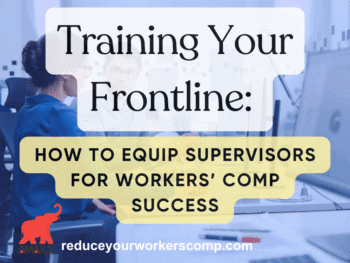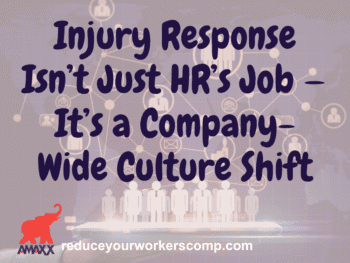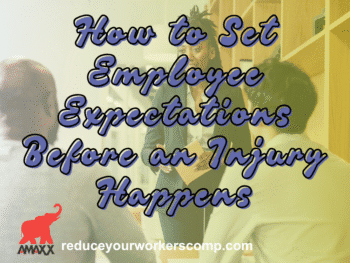It’s a fact — employers who actively manage their drug-free workplace program benefit from higher productivity, fewer work related accidents, lower absenteeism and lower medical cost (both from medical insurance claims and workers' compensation claims). Unfortunately 38% to 50% of all workers' compensation claims are related to substance abuse according to the Tennessee Department of Labor. At least a dozen states require the workers' compensation insurers to offer your company a premium discount if your company has a drug-free workplace program.
To achieve the benefits of a drug-free workplace, you need a drug-free workplace policy that is properly managed.
Management of a drug-free workplace program should include all of the following:
1- A Published Drug-free Workplace Policy
When your company implements a drug-free workplace policy, all current employees and all potential new hires must receive a copy of the drug-free workplace policy with an acknowledgment form. Employees or potential new hires are required to read, sign and date the acknowledgment form. Employers need to communicate to their employees that the acknowledgment form becomes a part of their personnel file.
A Drug Testing Program in Hiring
Every time you advertise to hire a new employee whether it is on the internet, newspaper or other media, always include a notice “We drug test all employees.” This approach eliminates many future problems as most regular abusers of drugs or alcohol will not apply for employment at your company.
It is also recommended all job interview locations display a large poster with wording similar to: “We Are a Drug-Free Employer. We Drug Test.” Display the poster where all job applicants cannot fail to miss it.
As a condition for employment, a pre-employment drug test should be performed (a few states require the drug test to be performed after they are hired). As a part of the drug-free workplace policy, all new hires must be free from any substance abuse. If the potential employee tests positive for drugs, the offer of employment immediately withdraw the offer of employment.
Never make the mistake of making an exception to the drug-free workplace policy in regards to hiring or employment of a substance abuser. If you do, you have invalidated your drug-free workplace policy, as all substance abusers will want “equal treatment.”
All new hire benefit packets given to the employees should include a pamphlet on drug abuse and abuse prevention. The packet serves as a reminder to the new employee that your company continues to place an emphasis on a drug-free workplace after hiring.
2- Random Drug Test
Most substance abusers know if they are “clean” for a week or more prior to taking their pre-hire drug test, the urine samples come back negative. They abstain from their bad behaviors prior to your pre-hire drug test, they test negative, you hire them and then they return to their previous substance abuse. The best way to combat this is for the new hire (and all employees) to know random, on-going drug testing is a condition for employment at your company and a positive drug test is grounds for immediate termination.
Random testing is a strong deterrent to on-going substance abuse by your employees. It is recommended you drug test at least half of your employees every year with the drug test being performed on a totally random basis. If you test one percent of your employees each week, you will test half of them in each calendar year.
As a part of your drug-free workplace policy, the employees grant your company permission to drug test any employee any time there is a reason to suspect drug or alcohol abuse. Your supervisors and managers should be trained to recognize the symptoms of drug abuse whether they are performance, behavioral or physical in nature.
3- Workers' Compensation Claims
Approximately 40 states allow or consider the denial of a workers’ comp claim if the injured employee was under the influence of alcohol or illegal drugs at the time of the work comp injury. Therefore, as a part of your drug-free workplace policy, a drug test should be required at the time of the initial treatment for any work comp injury. (If the employee tests positive for illicit drugs, and you terminate the employee for violation of the drug-free policy, many of the states will consider being under the influence as grounds for termination and will deny unemployment benefits to the terminated employee).
Post accident drug testing does cost money. However the money spent on the drug test is money well spent (remember the 38% to 50% of work comp accidents involve substance abuse). The amount of money saved on work comp claims, appropriately denied due to the employee’s use of illicit drugs or alcohol, far exceed the cost of the drug test.
4- Employee Awareness and Education
The poster “We Are a Drug-Free Employer. We Drug Test” or similar posters are not only displayed in the job interview locations within your company, they also are prominently displayed throughout your company. Good locations include in the parking garage or lot, at entrances to your building, in elevators, break rooms, time clock, etc.
Provide brochures, pamphlets and CDs on substance abuse prevention to all managers, supervisors and employees on a regular basis, at least yearly. If you still pay by pay envelope (instead of direct deposit) the brochures can be added to the pay envelope. E-mail is also a very effective way to put the message in front of the employees stating substance abuse is not tolerated.
5- Supervisor Training
Train your managers and supervisors to recognize the symptoms of drug and alcohol abuse. On-going training, at least annually, is key to keeping your managers and supervisors alert to the symptoms of substance abuse. Supervisors and managers with the proper training are then able to identify and deal with the employees suspected of having a substance abuse problem. (workersxzcompxzkit)
Summary
A properly managed drug-free workplace policy has a significant positive financial impact on your company. The number and severity of workers' compensation claims will be reduced, lowering the cost of your work comp premiums. In addition to lower work comp cost, you company will experience reduced absenteeism, reduced turnover, better employee morale and lower medical insurance cost.
Author Robert Elliott, executive vice president, Amaxx Risks Solutions, Inc. has worked successfully for 20 years with many industries to reduce Workers' Compensation costs, including airlines, health care, manufacturing, printing/publishing, pharmaceuticals, retail, hospitality and manufacturing. He can be contacted at: Robert_Elliott@ReduceYourWorkersComp.com or 860-553-6604.
Podcast/Webcast: Claim Handling Strategies
Click Here:
http://www.workerscompkit.com/gallagher/podcast/ Claim_Handling_Strategies/index.php
Do not use this information without independent verification. All state laws vary. You should consult with your insurance broker or agent about workers' comp issues.
©2010 Amaxx Risk Solutions, Inc. All rights reserved under International Copyright Law. If you would like permission to reprint this material, contact Info@ ReduceYourWorkersComp.com.



























